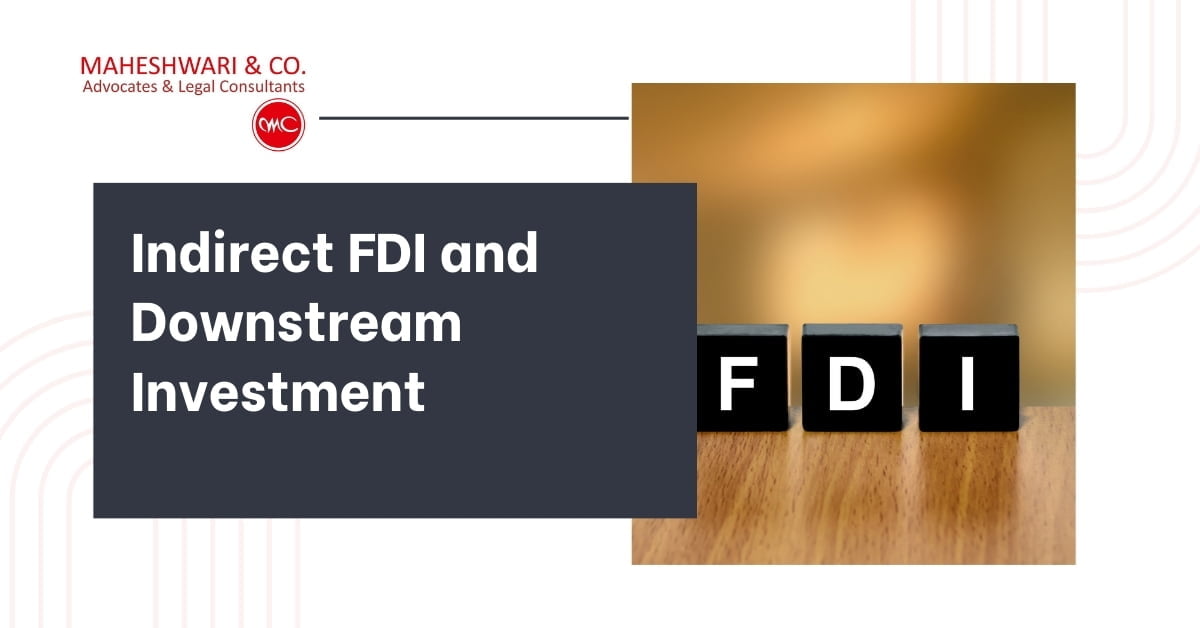Foreign Direct Investment – way to Indian Market. A foreign investor can invest in India either directly or indirectly through another Indian entity. Direct investment by a foreign investor is termed as foreign direct investment. However, foreign investment by a foreign investor through an entity/LLP incorporated under Indian Laws is known as downstream investment or we can say as Indirect Foreign Direct Investment.
As per the extant Foreign Exchange Management Act, 1999 (FEMA), rules and regulations made hereunder, An Indian entity that has received indirect foreign investment has to comply with the entry route, sectoral caps, pricing guidelines and other attendant conditions as applicable for foreign investment.
However, as per the FEMA (Mode of Payment and Reporting of Non-Debt Instruments) Regulations, 2019 the Indian entity making downstream investment into another Indian entity has to do the following Compliances:
- An Indian entity making downstream investment in another Indian entity which is considered as indirect foreign investment for the investee Indian entity in terms of the Foreign Exchange Management (Non-Debt Instrument) Rules, 2019 (FEMA NDI Rules) shall notify the Secretariat for Industrial Assistance, Department for Promotion of Industry and Internal Trade (DPIIT) within 30 days of such investment; and
- An Indian entity or an investment vehicle making downstream investment in another Indian entity which is considered as indirect foreign investment for the investee Indian entity in terms of Rule 22 of the FEMA NDI Rules shall file Form DI with the Reserve Bank of India (RBI) within 30 days from the date of allotment of equity instruments.
As discussed above, downstream investment needs to comply with the entry route, sectoral caps, pricing guidelines and other attendant conditions as applicable for foreign investment. The term “other attendant conditions as applicable for foreign investment” is broader and has not been defined in the FEMA NDI Rules.
However, deferral payment condition of Rule 9(6) of the FEMA NDI Rules as applicable for foreign investments covers the term “other attendant conditions”. The said Rule deals with deferred consideration and indemnity payable by FOCCs (Foreign Owned or Controlled Companies) as per the rule the deferred consideration shall not exceed 25% of the total sale consideration and the period of deferred consideration shall not exceed 18 months from the date of transfer agreement.
It is important to note that Rule 9(6) deals with the transfer of equity instruments (which includes equity shares) of an Indian company between a person resident in India and a person resident outside India.
In view of the above provisions, Rule 9(6) of the FEMA NDI Rules, which deals with deferral payment consideration, could be said to be applicable only in the case of the transfer of equity shares of an Indian company between a person resident in India and a person resident outside India and not for a transaction to be entered into between two persons resident in India. Further, an Indian entity (even though FOCC) is considered to be a “person resident in India” under the FEMA NDI Rules as it is a body corporate incorporated in India.
Hence, FOCC, being an Indian entity, would be considered as a person resident in India and, as such, Rule 9(6) of FEMA NDI Rules, which deals with deferral payment consideration, may not apply on transfer of equity shares between resident sellers and FOCC.
Further, transfer of equity instruments prescribed in Rule 9(6) of the FEMA NDI Rules shall be reported in Form FC-TRS on receipt of every tranche of payment – this reporting is not applicable for a transfer of shares between an Indian entity (even though FOCC) and a resident seller, i.e., a transaction between two residents in India.
Hence, in view of the harmonious reading of the above provisions under FEMA, it could be determined that Rule 9(6) of FEMA NDI Rules, which deals with deferred payment consideration, may not be applicable in the case of a transfer of equity shares of a resident seller to a person resident in India (though FOCC), since it is a transfer between two persons resident in India.
Author – Karishma Jaiswal, Senior Associate






